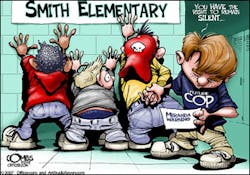My Kid Arrested Your Honor Student
I just finished a great workout, complete with cleansing sauna, and felt fantastic. Walking into the house, I threw my gym bag on the floor and noticed the flashing red light on the answering machine. I sat down on the couch and listened as a voice flooded the living room. Ms. Perin, This is Mr. Moore in the Principal's office. I have Drew here. We had a little incident at inside recess today. I sat frozen in place as the principal explained how my six-year-old had taken down a fellow student at Lego® gunpoint and arrested her for robbery. He stated he discussed the magnitude of the situation with my son and felt he understood the errors of his ways. I wasn't so sure.
My sons' father was a cop and their stepdad is a cop. Both he and his older brother grew up listening to tales of the street. My husband and I share the kind of relationship where he comes home from work and tells me about his day. Sometimes, his day is spent doing traffic stops or on a perimeter. Sometimes, his day involves chasing a bank robber down a dark alley. The boys hear many of the stories. They watch as he slips his bulletproof vest on, slides his gun belt in place, and flings the radio cord over his shoulder, slipping the tiny bud into his ear. When he walks out the door into the night, the boys' imaginations run wild filled with images of his stories and those they see on COPS.
Scientific studies support parental influence on their children. Both fathers and mothers play an important role in their children's lives, including role model and mentor. Although society might be taken aback by my child's oblivion to the unusualness of his games, it makes sense considering the home life my children exist in. Father-son bonding roles have taken a front seat in the dialogue of parenting in recent years. Self-esteem and societal identification stem from this role. Being a police officer is part of the identity my husband presents to my boys. Although this identity is often inflated by the media and Dirty Harry stereotypes, when my boys imitate their stepdad, an element of law enforcement officer is present. To them, he is authoritarian, the helper of the weak and a protector of the people. When they play with their friends, they also want to be these things. Hence, the arresting of classmates.
According to a study by Lisa Boyum and Ross Parke (1995), "the family provides the first context for the recognition and communication of affective messages. As the child moves outside of the immediate family environment, she will likely encounter others who do not share contextual cues with the child's family, do not share all the same display rules, and who may be less willing to make the extra effort to understand the child." Citing several studies, Boyum and Parke show how children manifest their understanding of their parent's role through interaction with peers.
In a post-Columbine America, it is scary to raise children imitating police parents. Zero-tolerance policies and the culture of fear permeates teachers, administrators and other parents and can paint officers' children as potentially violent and a threat to others. It is within this context that officers and their spouses must address any issue which comes up. When my oldest son was in first grade, I was met at his first parent-teacher conference with the words, "He seems obsessed with guns." His teacher followed this up with concerns over his knowledge of cleaning, shooting and other gun-related topics. The misunderstanding in her eyes did not match with the memories I had of my son sitting at the kitchen table while his father cleaned his Glock, and discussing the correct techniques for maintenance, as well as the various ways to tell if a person was a gang member.
Aside from role model issues, child rearing patterns also affect a child's socialization. Whether due to personality, training, experience or a combination of these, many police officers adopt an authoritarian style in their relationships. Many officers learn to conduct their relationships on equal ground, but sometimes the "you'd better respect me" attitude seeps into parenting.
Raising children is frustrating. A magnet on my refrigerator reads, "Raising children is like being pecked to death by chickens." I laugh every time I see it, then I sigh. I know my husband feels the same. As I raise my boys, I constantly struggle with finding the "correct" way to deal with a situation. As one is entering his teens, my frantic searching has gone into overtime. Like most parents, I look to how my parents behaved, information I've gleaned from books and magazines and the advice of pretty much everyone and anyone who had an idea I hadn't tried. My husband, on the other hand, has a unique pool of knowledge I don't. Through the academy and his career, he has been taught to convince, coordinate and control. When he is at a loss, it's easy for him to want to intimidate, investigate and interrogate. Unfortunately, this doesn't work well on children and can seriously damage relationships. So, my husband has to put aside this training and sit dumbfounded with the rest of us.
When my son came home from school after the arrest incident, he didn't say much. I asked him about it and he nonchalantly described how they were playing cops and robbers. He was just doing his job. Calmly, I explained to him that his family was different from other families and that his game scared the teacher and the principal. Drew stared up at me and wondered, "Why? It's what Dad does. Is that bad?" Grasping for words, I told him I understood his point and what Dad does was not bad. But, if he wants to arrest someone again, please play out in our backyard with the sheriff's son.
